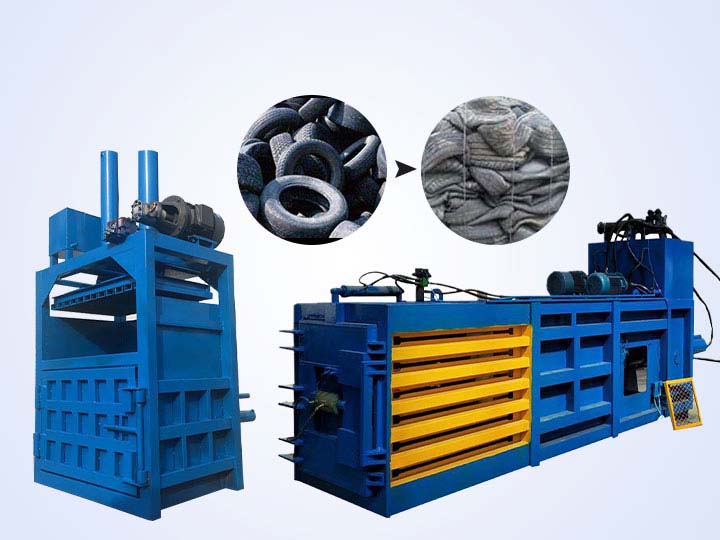Tire balers are essential equipment for waste tire management, providing a cost-effective solution for compressing used tires into compact bales for storage, transportation, and recycling. However, when it comes to acquiring a tire baler, businesses have to decide whether to buy or rent the equipment. Both options have their advantages and disadvantages, and the decision ultimately depends on the operation’s needs, budget, and long-term goals. In this article, we will discuss the advantages and disadvantages of buying vs. renting a tire baler.

Advantages of Buying a Tire Baler
Long-term Cost Savings: One of the most significant advantages of buying a tire baler is the long-term cost savings it provides. While purchasing a tire baler requires a significant upfront investment, it eliminates the ongoing cost of renting the equipment, which can add up over time. Moreover, buying a tire baler provides a more predictable cost structure, allowing businesses to budget and plan for maintenance and repair costs.
Ownership: Owning a tire baler provides businesses with greater control over the equipment and its usage. It allows businesses to customize the machine to their specific needs, providing greater flexibility and efficiency. Moreover, owning a tire baler ensures that the equipment is always available when needed, eliminating any potential delays or scheduling conflicts associated with renting.
Investment: Purchasing a tire baler is an investment in the long-term sustainability of the business. It provides an asset that can generate revenue and improve the bottom line by producing compact bales that can be sold to recycling facilities. Additionally, owning a tire baler demonstrates the business’s commitment to sustainability and waste management, promoting a positive image to customers and stakeholders.
Disadvantages of Buying a Tire Baler
Upfront Investment: The most significant disadvantage of buying a tire baler is the upfront investment required. This can be a barrier to entry for some businesses, particularly small or new operations with limited capital.
Maintenance and Repair Costs: While owning a tire baler eliminates the ongoing rental costs, it does require maintenance and repair costs. Businesses must factor in the cost of regular maintenance, including replacing worn-out parts and hydraulic fluid levels, to ensure the equipment operates at optimal performance.
Technology Obsolescence: The tire recycling industry is constantly evolving, with new technology and equipment emerging regularly. Purchasing a tire baler may mean the equipment becomes obsolete sooner than anticipated, requiring businesses to invest in new equipment to keep up with industry standards.
Advantages of Renting a Tire Baler
Cost Flexibility: Renting a tire baler provides businesses with cost flexibility, allowing them to access the equipment without a significant upfront investment. This is particularly beneficial for small or new operations with limited capital or those with seasonal needs.
Maintenance and Repair: Renting a tire baler provides businesses with access to maintenance and repair services, eliminating the need for in-house maintenance capabilities. This can be particularly beneficial for businesses with limited resources or expertise in equipment maintenance.
Equipment Upgrades: Renting a tire baler allows businesses to upgrade their equipment to the latest technology and industry standards, without incurring the cost of purchasing new equipment.
Disadvantages of Renting a Tire Baler
Long-term Cost: While renting a tire baler eliminates the upfront investment, it does come with ongoing rental costs. These costs can add up over time, making renting more expensive in the long run.
Limited Customization: Renting a tire baler limits businesses’ ability to customize the equipment to their specific needs, potentially leading to inefficiencies and lower productivity.
Limited Availability: Renting a tire baler means that the equipment may not always be available when needed, particularly during peak seasons or high demand periods.
Do you have an answer?
Whether to buy or rent a tire baler depends on the operation’s specific needs and long-term goals. Buying a tire baler provides long-term cost savings, ownership, and an investment in the business’s sustainability. However, it requires a significant upfront investment and ongoing maintenance and repair costs. Renting a tire baler provides cost flexibility, access to maintenance and repair services, and equipment upgrades. Still, it comes with ongoing rental costs, limited customization, and limited availability.
Ultimately, the decision to buy or rent a tire baler depends on the operation’s budget, needs, and long-term goals. For businesses with high demand, a consistent need for tire baling, and long-term goals, purchasing a tire baler may be the best option. However, for businesses with limited capital, seasonal needs, or uncertain demand, renting a tire baler may provide greater flexibility and cost savings. Regardless of the decision, it is crucial to choose a reputable supplier, ensure the equipment is the right size and capacity for the operation, and prioritize safety and maintenance to maximize efficiency and profitability.

